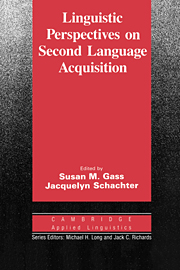Book contents
- Frontmatter
- Contents
- List of contributors
- Series editors' preface
- Introduction
- I THEORIES OF ACQUISITION
- Chapter 1 Second language acquisition theory: the case for a generative perspective
- Chapter 2 What is the logical problem of foreign language learning?
- II SYNTAX
- III SEMANTICS/PRAGMATICS
- IV LEXICON
- V PHONOLOGY
- Index
Chapter 2 - What is the logical problem of foreign language learning?
Published online by Cambridge University Press: 05 October 2012
- Frontmatter
- Contents
- List of contributors
- Series editors' preface
- Introduction
- I THEORIES OF ACQUISITION
- Chapter 1 Second language acquisition theory: the case for a generative perspective
- Chapter 2 What is the logical problem of foreign language learning?
- II SYNTAX
- III SEMANTICS/PRAGMATICS
- IV LEXICON
- V PHONOLOGY
- Index
Summary
The linguistic data to which children are exposed appear to be insufficient to determine, by themselves, the linguistic knowledge that children eventually attain. The gap between available experience and attained competence forms what has been called the logical problem of language acquisition. The approach to a solution, which has been followed in linguistic theory over the past two decades, is to suggest that the gap is bridged by an innate Universal Grammar: a system of knowledge of what a human language can be and innate domain-specific procedures for arriving at a grammar. The classic statement is that of Chomsky:
A consideration of the character of the grammar that is acquired, the degenerate quality and narrowly limited extent of the available data, the striking uniformity of the resulting grammars, and their independence of intelligence, motivation and emotional state, over wide ranges of variation, leave little hope that much of the structure of language can be learned by an organism initially uninformed as to its general character.
(Chomsky 1965:58)Adults may also learn foreign languages. Abstractly, the logical problem of adult foreign language learning is the same as for childhood language learning: explaining how acquisition takes place, given the limitations of the data. But the problem is also different, in important ways. Foreign language learning differs in degree of success, in the character and uniformity of the resulting systems, in its susceptibility to factors such as motivation, and in the previous state of the organism: The learner already has a knowledge of one language and a powerful system of general abstract problem-solving skills.
Information
- Type
- Chapter
- Information
- Linguistic Perspectives on Second Language Acquisition , pp. 41 - 68Publisher: Cambridge University PressPrint publication year: 1989
Accessibility standard: Unknown
Why this information is here
This section outlines the accessibility features of this content - including support for screen readers, full keyboard navigation and high-contrast display options. This may not be relevant for you.Accessibility Information
- 299
- Cited by
